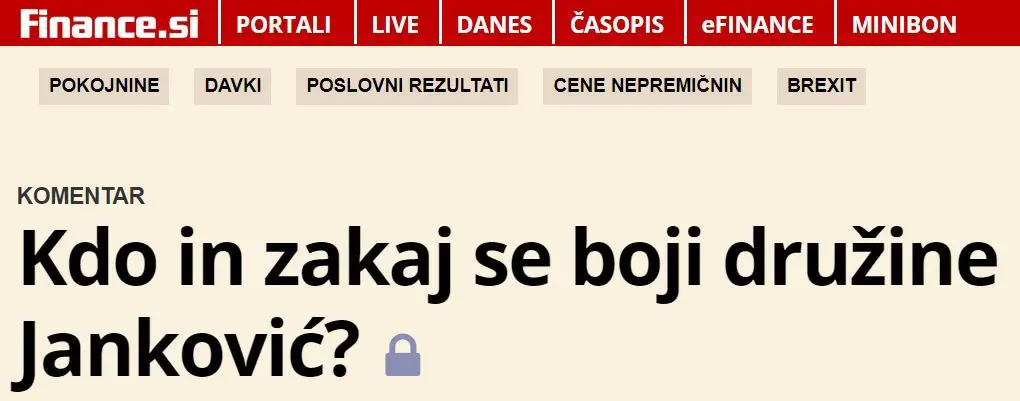Ljubljana related
STA, 18 September 2019 - Police are looking into three cases of simplified debt restructuring that would allow companies owned by Ljubljana Mayor Zoran Janković's sons to write off about EUR 29 million in debt. The General Police Administration confirmed the news for the STA on Wednesday.
"Police are checking certain circumstances in these cases and if we find grounds to suspect that a criminal act was committed ... we will act accordingly," the Police Administration said after the newspaper Finance reported on the matter.
The news of the write-off of the debt by the companies Electa Inženiring, Electa Naložbe and Electa Holding, owned by the mayor's sons Damijan and Jure Janković, has provoked public outcry and led to calls to change bankruptcy law.
Simplified debt restructuring was originally designed to speed up bankruptcy procedures for small firms and sole proprietors, but the rules are so lax that even companies with millions in assets, including financial holdings such as Electa Holding, can take advantage of the procedure.
The decisions on simplified debt restructuring for Electa Inženiring and Electa Naložbe have become final, while in the case of Electa Holding, the Ljubljana District Court is challenging the decision in its capacity as a claimant over unpaid court tax. The appeal will now be deliberated on by the Ljubljana Higher Court.
According to Finance, in all three cases, the decisions on simplified debt restructuring had been made thanks to debtor-friendly companies owned by Jan Bec, who has purchased the claims that one of the creditors, Heta Asset Resolution, had to the three companies. Thus he had the main say on the future procedures.
Web portal Siol.net also reported today that the Notary Chamber is checking the work of notary Miro Košak in the three cases. Košak made all the notary work related to the debt restructuring procedures.
The question is whether Košak acted with due care and made sufficient effort to stop the manoeuvres with which Damijan Janković planned to achieve the debt write-offs, Siol says.
Notaries are also obligated to report any suspicion of a crime.
The portal also suggests that Košak must have known that some of the biggest creditors of Electa Inženiring, Electa Naložbe and Electa Holding were in fact controlled by Damijan Janković, which means that the simplified debt restructuring should not be valid.
STA, 16 September 2019 - The business newspaper Finance comments on Monday about the debt of the Janković family that has recently been written off, wondering who and why is afraid of the family of Ljubljana Mayor Zoran Janković.
The key question in all this is who is the man who bought most of the debt of Janković's sons Jure and Damijan. Where has the money, some EUR 30 million, including a EUR 5 million debt held by Zoran Janković, come from?
The paper also wonders whether any authority is looking into the assets of the man, a Jan Bec, who bought the debts.
This is not the only scandal involving the Janković family, the author of the commentary notes. "Personally, I am not a fan of conspiracy theories, but there have simply been too many happy endings involving the Janković family to call it luck."
"Considering all the scandals and financial 'innovations' it is only logical to ask: Who and why is afraid of the Janković family?" the paper wonders in a commentary with the same headline.
finance.si
June 4, 2019
With the beginning of June the last of eight court decisions that prevented the city government of Ljubljana from taking control of the Rog bicycle factory turned squat were decided in the city’s favour, and thus the authorities are expected to begin their long-planned renovation process. However, even though the court ordered eight of the squatters to leave the land, there remain about a hundred other users who refuse to leave the premises.
Some of the current Rog users, worried the city government might begin their work any time now, began building a barricade to prevent construction machinery from entering the main yard. In doing so they have entered into several conflicts, one with the police and two with the construction workers that are currently replacing pipes on Trubarjeva Road. The first incident occurred with workers walking into the Rog yard in order to inspect and start digging for the heating pipes there, the second when local citizens noticed how Rog users went into Trubarjeva Road in order to collect material from the construction site, presumably to be used in their barricade.
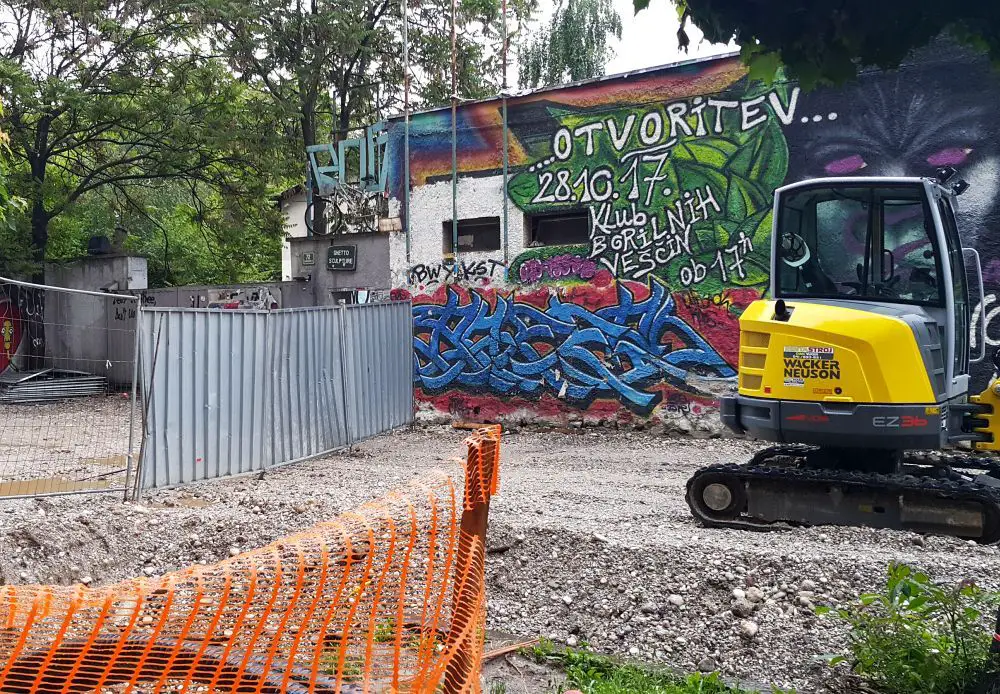
Although some of the self-styled representatives of the Rog squat are calling for more dialogue with the city government, in an interview for MMC from January this year Mayor Jankovič expressed frustration with the mediation process, stating that at a certain point the city was offering Rog users 500 sq metres of renovated properties to use. When this offer was rejected, he said that the city government lost interest in continuing talks with the squatters.
Last week the city government declared the beginning of the renovation works by choosing the construction company that is going to build an access ramp for the underground parking garage that is planned at the site of the new Rog Centre project.
We are not sure how the construction of the ramp is going to be possible under the current circumstances, but can presume it will not be smooth, fast nor cheap.
April 1, 2019
In 2007 Slovenia celebrated the 50th anniversary of the death of Slovenia’s greatest architect, Jože Plečnik. In the same year an inter-ministerial commission was established to carry out the strategy of the protection of cultural and natural heritage, following the 1972 UNESCO recommendation and other legal international commitments for preservation of civilizational achievements.
One of the stages of this process was to prepare a preliminary list of potential world heritage candidates, and in this process all of Plečnik’s work in Ljubljana was declared cultural heritage of national importance in 2009, hence becoming a possible candidate for UNESCO civilisational heritage protection list. In his lifetime Plečnik’s architecture marked several of Central European cities significantly, in particular Ljubljana and Prague. Since the international positioning on the works of the 20th century is pretty much unclear at the moment, so is the process of recognising Plečnik's work, which was submitted for evaluation in 2015, including one work in Prague and a colleciton of works in Ljubljana.
Regardless of the civilisational prospects of Plečnik’s nomination for UNESCO status, his entire Ljubljana work was declared cultural heritage and of national importance in 2009, and part of that heritage is Central Bežigrad Stadium, the construction of which spanned over the second half of the 1920s and into the 1930s.
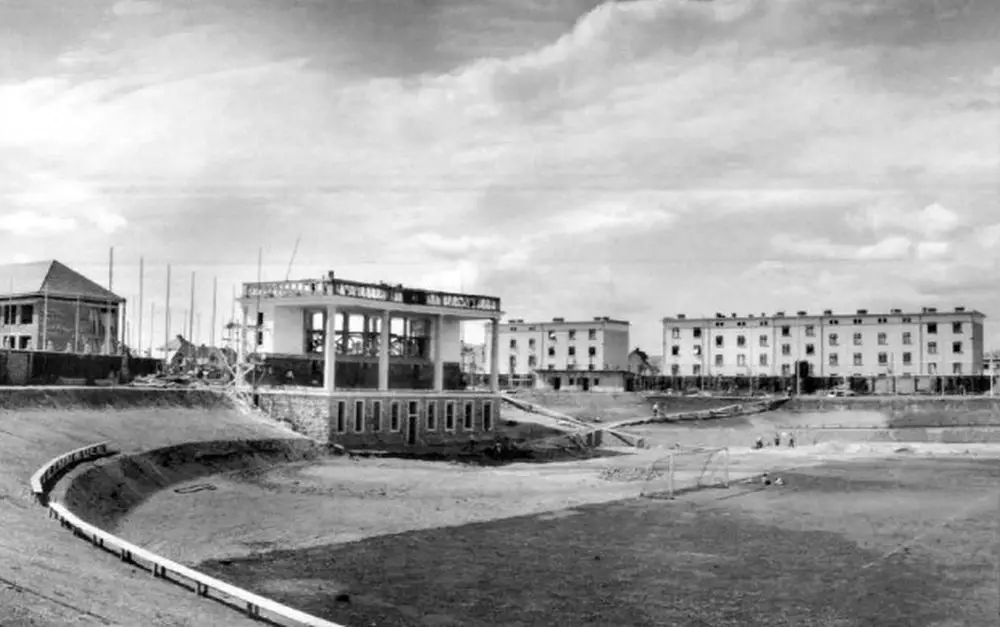
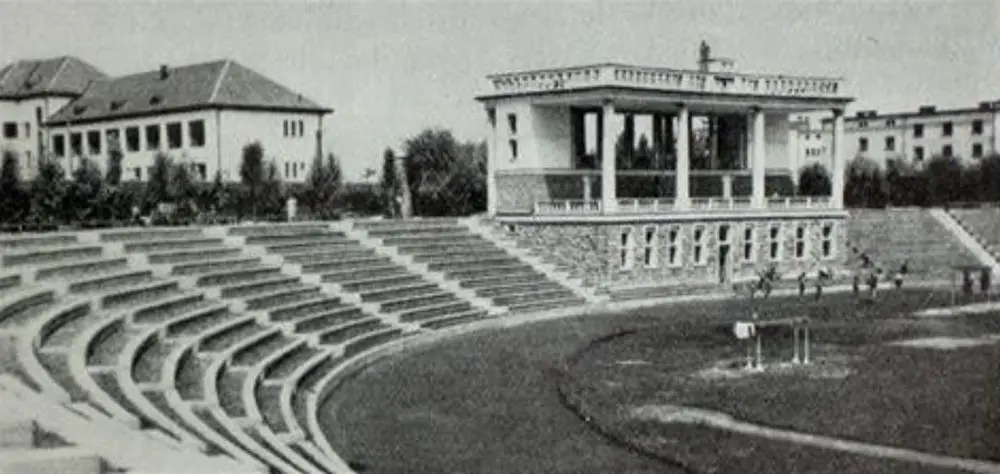
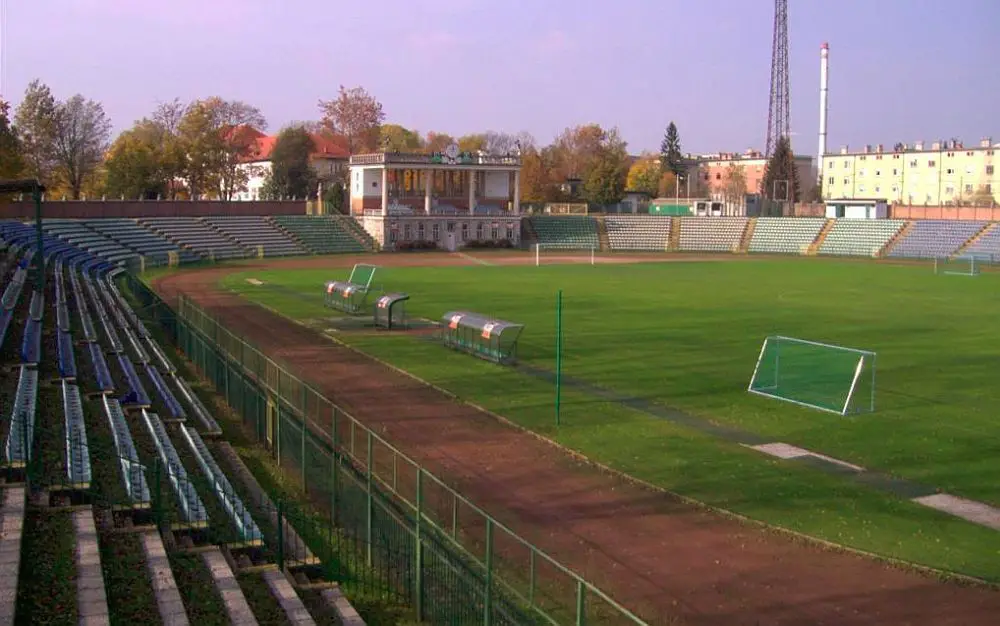
Moreover, in 2007 Ljubljana and Slovenia in general were suffering from the lack of a stadium that could host a major sports event and provide roofed tribunes for an adequate number of spectators. Providing the capital with such a venue was one of the 2006 local election campaign promises of Zoran Jankovič, Ljubljana Mayor since 2006.
In 2007 the city government of Ljubljana (MOL) found an interested investor for the reconstruction of Plečnik’s Stadium, a slot machine baron Joc Plečečnik, who also owned a gambling salon in Grosuplje and the Hotel Lev’s Casino until 2018, when they were sold to Austrian gambling giant Novomatic. According to Peter Rondaij’s open editorial for Dnevnik, Pečečnik’s interest in renovating the stadium was strongly related to his attempts at a Nevada (USA) non-restricted gambling licence, which would have been (and eventually was) granted to him on the condition of his general good track record that also involved a proof of active engagement in the field of culture.
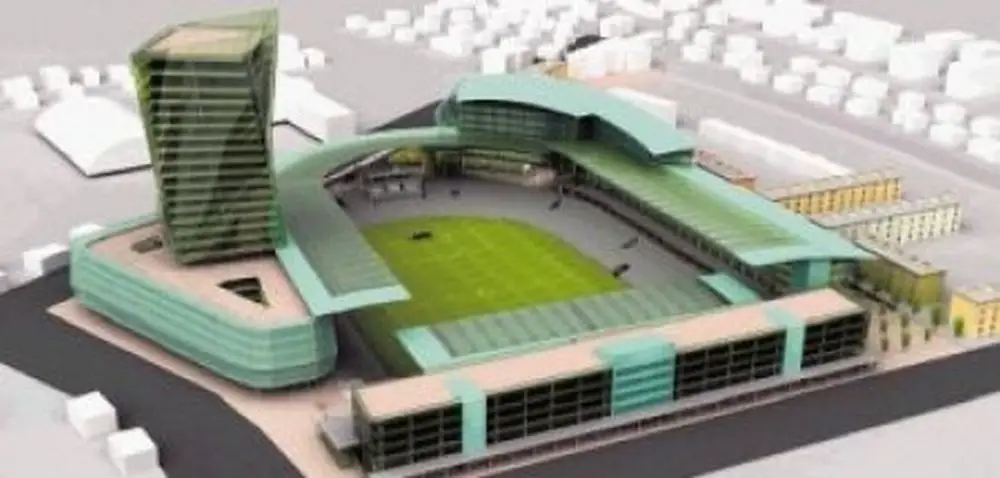
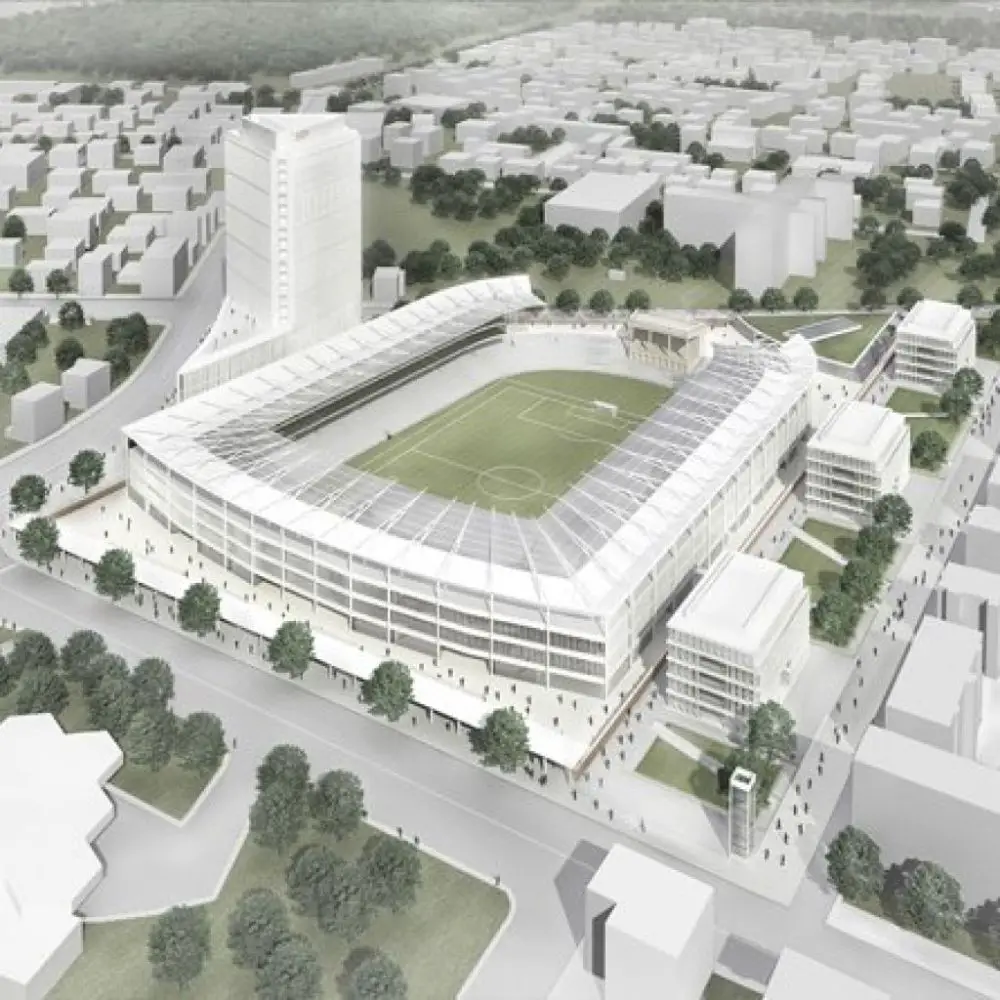
The winner of the public competition for the reconstruction of Plečnik’s Stadium 2009, designed by the German architectural studio GMP, was based on detailed urbanistic plans drawn-up by city Vice-Mayor Janez Koželj half a year later. The inspiration for the spatial planning seems to be heavily influenced by Pečečnik’s original plans for a skyscraper and a vast commercial area spreading deep underground. In the original plans five, not three, commercial buildings were intended by the northern wall of the stadium, currently hosting public gardens that have been in public use since the neighbourhood was built in the 1930s.
In October 2007, Bežigrad Sports Park Ltd. was established with the main shareholder being Pečečnik’s GSA (59%), the City Government of Ljubljana (28%) and Slovenian Olympic Committee (13%), the latter two contributing their shares in land. The property was immediately closed to the public using a construction fence and the project seemed to have proceeded without much need for either transparency or participation on the side of the public. Starting immediately after the fencing of the premises, citizens living nearby could only observe how the first thing to happen behind closed walls in December 2007 was the removal of floodlights and grass surface altogether, along with the drainage system. Part of a southern wall was demolished so that heavy trucks could get in and out. At the beginning of 2008, local residents also reported that all copper gutters and drain pipes has been removed from the gloriette, which was also reportedly deprived of its electric installations and then left with windows and doors open, which was done, according to speculation of the locals, to let vandals in so that they could destroy what the weather and time would not. According to Rondaij, this approach isn’t new. With “self-demolition” of protected buildings investors can clear a prime location for any development they want.
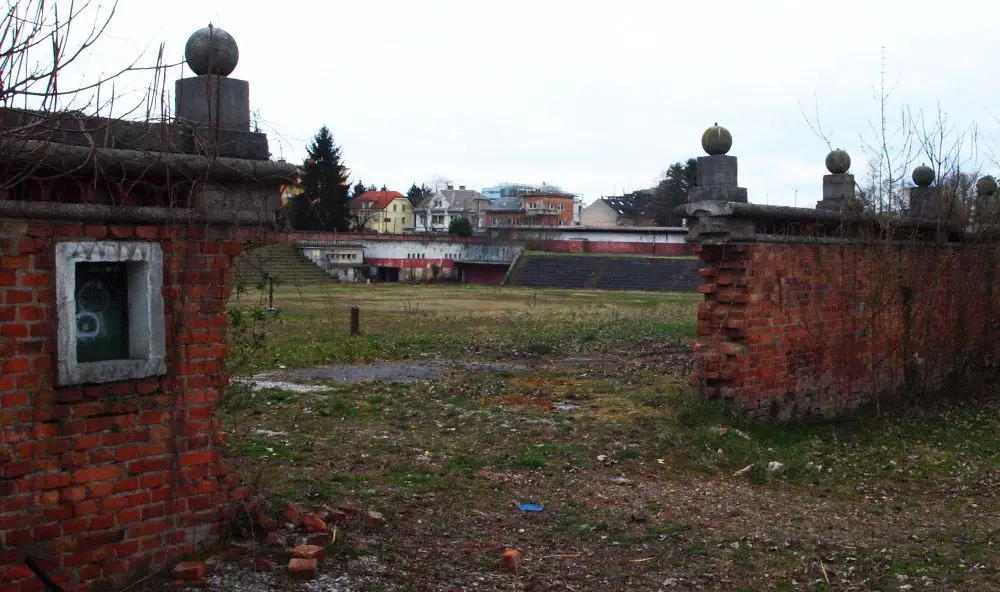
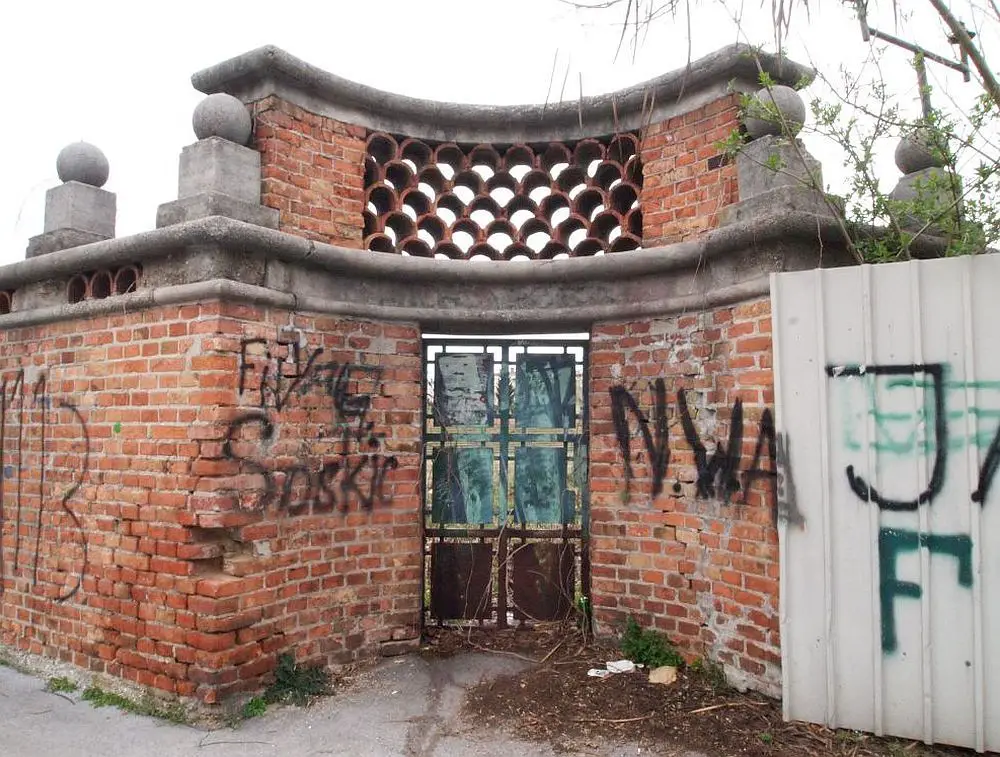
Meanwhile, in March 2008 an agreement was signed for another sports centre in a much more appropriate location for hosting masses of sports fans and concert goers. Right next to the highway ring-road of Ljubljana, a stadium and another roofed hall has already been completed and pretty much functional since 2010 in Stožice. With these facilities in place, the urgent need for a sports centre ceased to exist and the arguments for another such complex in the downtown area of a “green” capital that aims to replace dirty traffic with bicycle lanes and trees doesn’t seem to hold much water. Especially since this concrete moneymaking monster with several football field sized floors of parking lots is supposed to grow above and under a monument of protected cultural heritage.
The whole process seems to have taken a few shortcuts, one of them being the circumvention of the affected public, in particular the Fond community dwellers, who were left out of all discussions. In 2009 new spatial plans were shown to them which is how they learned that they would lose their gardens and views. The city government gave up the land as its 29% investment in Bežigrad Sports Centre Ltd. It was only from these plans, drawn up without alerting the general public, that one resident even found out that her house was set for demolition (source).
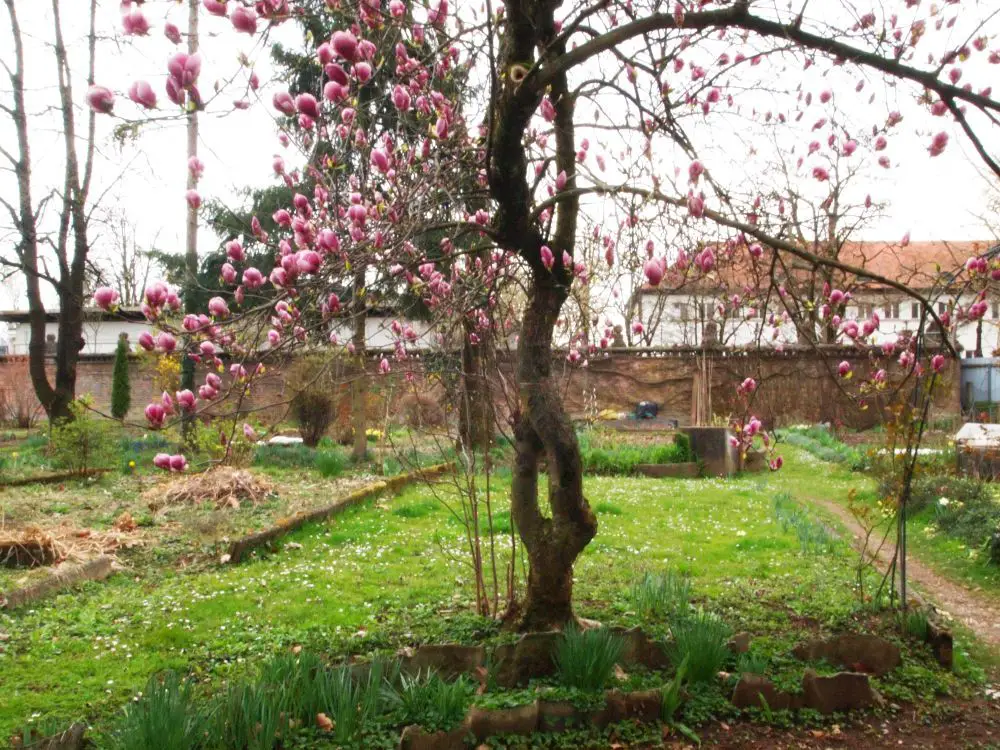
How a polarising project like this can continue to survive into the present is a mindboggling question. One of the explanations worth mentioning has been explored in detail in a graduation thesis, written by Danaja Visković Rojs. In short, the thesis contextualises the problem into the weak political culture of transitional societies, in which representatives lack the understanding of the nature of legitimacy of their governing jobs. Public participation in important decision-making processes, such as spatial planning, is a fundamental ingredient of democratic societies, something leaders of countries in transition to democracy find difficult to understand, instead taking their role of decision-makers as absolute. In return they lose the legitimacy of their political leadership, which they tend to compensate for with proofs of legality, exacerbating the conflict further.
In 2010 Zoran Jankovič, the Mayor of Ljubljana explained to Delo why the project continues to persis: while the city government contributed only land and wouldn’t lose anything by the contract ending, Joc Pečečnik invested money and would therefore lose €15 million if the project didn’t get through, which wouldn’t be fair to him. Which method of accounting brought Pečečnik to this number, Mayor Jankovič did not explain. The list of maintenance costs according to the official project’s website amounts to only €77,500. Yet the Mayor of Ljubljana seems to have a greater understanding for the interests of the city’s business partner, by now a “small king” of Las Vegas, rather than for the citizens who elected him.
Not surprisingly, in his interview for Delo Joc Pečečnik expressed great satisfaction with the city government’s collaboration, saying he has “no complaints” whatsoever. His take on Fond’s community protests, that are delaying the construction of the stadium, is simplistically legalistic with a neo-liberal newspeak definition of “public interest”: nobody has the right to interfere with his private property and it is the state’s duty to “protect the entrepreneur” and “allow him to create jobs and added value”. If someone out there wishes to use the stadium for “their own personal interest and (use it to) grow lettuce”, he has already offered to “buy his share for a very reasonable price”.
The city government and the Ministry of Culture told 24UR that they do not have the money to buy Pečečnik’s share. But do they even need to? They can simply leave the project and allow the lettuce continue to grow.
STA, 7 March 2019 - The Ljubljana District Court acquitted Ljubljana Mayor Zoran Janković of bribery charges in the Gratel case on Thursday. The prosecution sought a three-year prison sentence and a EUR 50,000 fine for Janković. It also wanted the Ljubljana municipality to return the donation it received from the company Gratel.
The ruling is not final yet and prosecutor Blanka Žgajnar announced an appeal.
The case concerns EUR 500,000 which the mayor demanded from construction company Gratel in March 2007 to allow it to dig roads to install optic cables.
Gratel then transferred two EUR 250,000 instalments to the municipality as a donation for the renovation of Ljubljana Castle.
This enabled it to resume its work under a new development permit after Janković had initially banned Gratel from digging on public premises.
Janković argued that the payment had been made in compensation for the damage incurred by the city because Gratel had dug up wider conduits and installed more cables than agreed.
He maintained throughout the trial there was nothing wrong with a company making a donation to a public institution, saying it caused no harm to anyone and nobody except the prosecutor was claiming anything back.
Gratel owner Jurij Krč backed up his story, saying the donation to Ljubljana Castle was not a bribe but a payment in line with the contract, while former Gratel CEO Drago Štrafela said he did not understand why the money should be paid to the municipality, arguing the city suffered no damage.
In presenting closing arguments today, prosecutor Žgajnar said Janković had used his power to pressure Gratel into the donation. "When they did that, he allowed them to continue the work," she said.
"Donations are not forbidden if they are voluntary," she stressed, adding that three witnesses had confirmed that the defendant had demanded money. She believes that the one witness who did not confirm this was not telling the truth.
But Judge Vladislava Lunder said today that the evidence presented had not corroborated the claim that Janković had demanded a bribe and that none of the witnesses had confirmed this.
"None of the witnesses confirmed the claim that Janković made obtaining the permit conditional on the payment of the damages," the judge said.
The problems of the project as part of which Gratel was building an optical network for operator T-2 had started in 2006, which is before Janković became mayor. According to Lunder, not only testimonies of witnesses but also documents presented as evidence showed this.
The judge was not convinced by the prosecutor's claim that Janković had revoked the permit to Gratel only to allow it to continue work once it paid a bribe.
Žgajnar moreover said that Štrafela had softened his statements compared to those he had given to police during the investigation. She believes it was him who had made the deal with Janković.
Janković's lawyer, Janez Koščak, said that no proceeding had been filed against the person who allegedly paid the bribe so technically there was no bribe to be accepted by Janković or the municipality.
He said Janković was on trial for acting with due care and diligence by demanding compensation after a contract partner had violated the contract. "If he hadn't done that he could be indicted for negligence."
Janković said today the had been the target of a political campaign by four persons, including Žgajnar, for the last four years. He believes this attack had been triggered by a "pamphlet of the parliamentary enquiry which was led by Alenka Jeraj of the SDS."
Jeraj of the opposition Democrats led between 2009 and 2011 a parliamentary inquiry into major public construction projects and other major investments funded from the Ljubljana or state budgets.
The final report of the inquiry commission, which had also investigated construction deals of companies owned by Janković's family members, suggested that Janković abused his power to allow his sons to profit from a re-zoning plan that opened agricultural land for construction.
All our stories on Ljubljana Mayor Zoran Janković can be found here
STA, 31 January 2019 - The Ljubljana District Court heard Gratel owner Jurij Krč back Ljubljana Mayor Zoran Jankovič on Thursday in a case in which the mayor stands accused of taking a bribe to the benefit of the city. Much like Janković last week, Krč said the donation to Ljubljana Castle was no bribe but a payment in line with the contract.
The indictment says that soon after becoming mayor in late 2006, Jankovič demanded that Gratel pay a donation of half a million euro to the municipality to be allowed to continue digging roads to install optic cables for telecommunications company T2.
The prosecution argues Jankovič had unjustifiably revoked the permit for temporary road closures Gratel had received from his predecessor just before the 2006 local elections and then made a new contract with the company.
But he added a damages clause, thereby assuming powers of the city's traffic department, which is in charge of issuing permits for road closures, according to the prosecution.
Janković told the court last week he had annulled the permit signed by his predecessor Danica Simčič because it was illegal, as it should have been issued by the city's traffic department. He said legal expert Rajko Pirnat confirmed this.
"We had an agreement on how to come to the site, whom to inform, who must be present. The deal also had a provision on damages for making a spatial intervention that exceeds the one outlined in the permit for temporary road closures," Krč said today.
"We had an agreement with the mayor to pay the damages and we did," he added.
According to Krč, Janković did not set the donation as a condition for the continuation of works. As Gratel owner Krč said he did not feel there was something wrong with the payment because it was in line with the contract. "We would have to pay one way or another," he said.
Janković said the deal was that the company either pays damages or makes a donation. The money was allocated to the same purpose any way, he said.
Former T2 adviser Miran Kramberger also took the stand today, saying that T2 was in the middle of negotiations for a loan with a consortium of banks at the time and that any interruptions in the construction works would have affected the process.
All our stories on Mayor Janković can be found here
STA, 22 January 2019 - Having pleaded not guilty in the Gratel case last November, Ljubljana Mayor Zoran Jankovič presented his view of events as the trial opened at the Ljubljana District Court on Tuesday. He labelled the indictment, which accuses him of taking a bribe from the company Gratel to the benefit of the city, a plot against him.
The indictment says that soon after becoming mayor in late 2006, Jankovič demanded in early 2007 that construction company Gratel pay a donation of half a million euro to the municipality to be allowed to continue digging roads to install optic cables for telecommunications company T2.
Prosecutor Blanka Žgajnar told the court Jankovič had unjustifiably revoked the permit for temporary road closures Gratel had received from his predecessor just before the 2006 local elections.
He had then concluded a new contract with the company, but added a damages clause, thereby assuming powers of the city's traffic department, which is in charge of issuing permits for road closures.
Presenting his side of the story, Jankovič denied all charges as unfounded, saying Žgajnar was prosecuting him because she did not like him.
"The documents which the police obtained as part of the investigation don't substantiate the claims in the indictment. This was not a donation, it was an agreement on damages," he said.
He said he had annulled the permit signed by his predecessor Danica Simčič because it was illegal, as it should have been issued by the city's traffic department.
The mayor said the municipality had commissioned a legal opinion from legal expert Rajko Pirnat which confirmed the permit should not have been signed by Simčič.
He explained that soon after becoming mayor he had received many complaints from locals and public companies about how Gratel was installing optic cables in Šiška borough.
Janković said the damages Gratel had paid were lower than what it had for instance paid the Kranj municipality for the same job of installing optic cables.
He stressed the amount had been set in talks with Gratel, which was in no way the weaker party, having strong lobbyists on its side.
What is more, the company decided on its own to pay the damages to the company running Ljubljana Castle, he stressed and called on Žgajnar to withdraw the indictment.
The next hearing is scheduled for 31 January, when Gratel owner Jurij Krč and former T2 boss Miran Kramberger take the stand.
All our stories on Mayor Janković can be found here
STA, 29 November 2018 - Mayor of Ljubljana Zoran Janković pleaded not guilty as he appeared in court for a pre-trial hearing on Thursday in the Gratel case, in which he is charged with taking a bribe from a company to the benefit of the city.
"I think I'd be guilty if I hadn't done what I'm charged with," he told judge Vladislava Lunder at the Ljubljana District Court.
The case concerns EUR 500,000 which the mayor demanded from construction company Gratel in March 2007 to allow it to dig roads to install optic cables.
Gratel then transferred two EUR 250,000 instalments to the municipality as a donation for the renovation of Ljubljana Castle.
This enabled it to resume its work under a new development permit after Janković had initially banned Gratel from digging on public premises.
The payment was compensation for the damage incurred by the city because Gratel had dug up wider conduits and installed more cables than agreed.
Janković had already denied the allegation of bribery when the police raided the offices of the municipality and several other locations in February 2014.
His defence counsel Janez Koščak demanded today that evidence obtained in the 2014 house searches be excluded, arguing it had been obtained by violating human rights.
The lawyer explained the relevant court order had not specified the suspected crimes, which made the house searches unlawful.
Upon leaving the courtroom, Janković said he did not understand what prosecutor Blanka Žgajnar wanted to achieve with the indictment.
"A private company has paid compensation because it assessed it had installed too many cables," Janković repeated his view of the case.
He reiterated there was nothing wrong with a company making a donation to a public institution, saying it caused no damage to anyone and nobody except the prosecutor was claiming anything back.
Janković is convinced he is innocent: "I believe I'll prove my justice. They cannot sentence an innocent person."
He told the judge he had came to the courtroom "out of respect for the court", having had a business trip scheduled for today, which means he could have avoided it.
The main hearing in the Gratel case will start on 3 January.
Janković has another trial coming up soon, where he faces allegations of fraud concerning EU funds for the Stožice sports complex project.
While the trial starts next week, the pre-trial hearing for him is scheduled for 12 December.
Jankovič, who has led Ljubljana since late 2006, is also subject to criminal proceedings in several other cases.
Mladina: Why is Cerar so friendly to Hungary?
STASTA, 23 November 2018 - The left-wing weekly magazine Mladina analyses on Friday Slovenia's conduct towards Hungary regarding its participation in the Koper-Divača rail expansion. It wonders what was behind the former Miro Cerar government's push for Hungary's involvement and its lenient treatment of the neighbour's plans to extend influence in Slovenia.
Hungarian PM Viktor Orbán has pulled out of the rail expansion because he changed his mind when realising he bet on the wrong horse, editor-in-chief Grega Repovž says under From Hungary to Koper, noting Orbán counted on his EPP "comrade" Janez Janša, into whose media outlets he has invested a lot of money.
If Janša was in power, Orbán would probably already be buying ships to create a Hungarian fleet, Repovž says in reference to Orbán's statement that he wanted to make the Slovenian port of Koper Hungary's gateway to the world.
He also made it clear, as he visited the Hungarian minority in the Slovenian town of Lendava last week, that Cerar's government had promised Hungary 50,000 sq. meters of land in Luka Koper, that is a position which would enable it to form its own fleet.
What Repovž finds particularly intriguing is former Prime Minister Cerar's conduct in relation of Orbán's "attack" on Luka Koper, which operates the port of Koper.
He finds Cerar's enthusiasm about the rail expansion towards Koper incomprehensible in the first place, saying expanding the port on the small Slovenian coast is not the only development option.
The editor notes that with 200 million euro, the amount Hungary would contribute for the rail expansion, miracles could be made with more environment-friendly projects.
Nevertheless, Cerar was pushing for the port's expansion despite potential environmental issues.
He also insisted on Hungary's participation despite being aware that Orbán was betting on somebody else in Slovenia and that by sponsoring Janša and his Democrats (SDS), he was in fact undermining Cerar.
Cerar's conduct was "totally illogical", even more so because he in fact supported the potential of a country which is Slovenia's competitor.
What is also puzzling is that Cerar's government silently accepted Hungary's extending its influence in the Slovenian region of Prekmurje, where it is making investments and granting citizenship to members of the Hungarian ethnic minority.
Repovž wonders what was behind the Cerar government's benevolent treatment of Orbán's plans and why he was so outraged when Orbán announced to pull out of the rail project.
Demokracija: Sickened by Janković's victory in Ljubljana
STASTA, 22 November 2018 - The right-wing weekly Demokracija deplores the election victory of Ljubljana Mayor Zoran Janković in the latest editorial, expressing concern about an emerging "kleptocratic axis" between Ljubljana, Maribor and Koper.
The editor-in-chief Jože Biščak says that Janković is running the capital city in a kleptocratic, corruptive and morally perverted way; "by awarding some kind of LGBT certificates to schools and kindergartens he indoctrinates the youngest with an ideology that defies common sense and Catholicism".
Biščak is also critical of the Catholic Church for not publicly endorsing Janković's challenger in Sunday's election, Anže Logar of the Democratic Party (SDS), suggesting this would be appropriate because of Janković's "arrogant and contemptuous attitude to Catholics".
"It would be too cheap to point the finger at the Church for making a new victory possible for Janković. No. Ljubljana remains the breeding ground of organised criminal rings and corruption, the city of the sheriff 10% who is distributing bread among parasites, consultants and the leftist city elite.
"This company, including the non-natives who have turned the capital into a little Yugoslavia, was obviously large enough for a victory at the given turnout."
However, Biščak also says that Anže Logar activated more of the electorate than anyone would expect and that the proportion of the vote he won indicates an inevitable end to Janković's parallel economy.
Biščak also expresses concern about what he terms a kleptocratic north-south axis in the headline of his commentary. He is concerned the run-offs in Maribor and Koper may be won by "persons who have the same mindset as the Ljubljana sheriff. Boris Popović has 'proved' himself, and Saša Arsenovič (if he defeats Franc Kangler) certainly will as he has said it publicly that Zoran Janković is his mayoral role model."
Referring to the poor showing of the ruling coalition, Biščak says that such a result would send party heads rolling in developed democracies. He also rebukes the left bloc for failing to file top-tier mayoral contenders in Ljubljana and Maribor.
However, he offers the higher turnout as proof that "political apathy is over and that a large part of the country that is not related to urban municipalities is healthy and not yet infected with the immoral leftist agenda".
Other articles in this series can be found here
STA, 19 November 2018 - Zoran Janković won his fourth straight term as mayor of Slovenia's capital as voters overwhelmingly endorsed his vision of Ljubljana's development in Sunday's local elections and his list regained majority in the local council.
According to incomplete results, Janković secured 61.4% of the vote, which is slightly more than in the 2014 election (57.3%).
Anže Logar, the candidate of the Democratic Party (SDS) who enjoyed the support of the entire right-wing bloc, won 28.8% of the vote, more than any other candidate challenging Janković in his 12-year stint as Ljubljana mayor.
Janković's list won 23 seats in the 45-seat city council to regain the majority he held in his first two terms, after winning 21 seats in the 2014 election.
The SDS will be the second strongest faction with ten councillors, three more than in the current council, followed by the Left, which gained one seat to four. The conservative New Slovenia (NSi) and the Social Democrats (SD) will have two seats each.
The Marjan Šarec List (LMŠ), the Modern Centre Party (SMC) and the Alenka Bratušek Party (SAB), which together with the SD make up the minority national government, secured one seat each.
In his first comment on the election victory, the 65-year-old Serbian-born manager said the outcome showed the people of Ljubljana "want the kind of development they have seen so far".
Janković's time as Ljubljana Mayor has seen a transformed city, with allegations of corruption
Over the past 12 years, Janković and his team transformed Ljubljana through a series of projects, including a complete makeover of the city centre, large sections of which have been pedestrianised.
However, Janković has been facing recurring allegations of corruption, cronyism and shady ways in which the city has been awarding contracts to private partners, as well as criticism of his autocratic style of leadership.
Janković said that the people of Ljubljana showed they wanted an open, solidarity-based and comrade-like town, a reference to Logar's party, which has been promoting anti-migrant views, and Longar's statement that he would not attend a gay pride parade.
Both Janković and Logar said they were glad that the turnout was higher than four years ago. Data available so far show that 29.86% of the voters turned out in Ljubljana until 4 PM, which compares to 22.06% four years ago when the final turnout was 35.92%.
Janković said he would have wanted the turnout to be even higher, but that the outcome had obviously been clear beforehand. "Many reckoned that I'll win in the first round and they chose to stay at home or take a trip."
Looking at his new term, Janković announced 500 more projects in Ljubljana, which he said would bring greater quality of life and more global awards. Ljubljana won the title of the European Green Capital in 2016. He dismissed criticism as talk devoid of argument and populism.
Janković congratulated Logar on his showing, saying that he unified the right bloc. But he also said that the voters in this election was split along the left-right divide and that the proportion won by Logar was obviously as much as the right could count on winning in Ljubljana.
Commenting on the outcome of his list, he pledged to build a coalition even though his list won a majority, "with those who support the development programme. But I won't engage in dealing out."
Logar expressed his satisfaction that more people turned out in Ljubljana than four years ago, which he suggested was thanks his "agile election campaign" which "woke the electoral base from sleep".
Logar said considering that he and Janković won 90% of the vote, the question was that meant for the government coalition parties. He also said that if the ruling coalition "offered one strong candidate, we would have a run-off".
Logar's party boss, Janez Janša commented that Janković's "method appears to be more effective than a classic approach to democracy", while he would not say whether Logar was his successor.
Asked who could defeat Janković, Janša said it was the people of Ljubljana. "I doubt though that anyone of potential political competition in a position to apply the same methods as he [Janković] does".
Of the remaining eight mayoral contenders, Milan Jakopovič, the candidate of the Left, came in third with 3.8% of the vote.
The best result among the candidates of the government coalition parties appears to have been secured by Dragan Matić of the Modern Centre Party (SMC) in fifth with 1.5%.
Born in a village near Serbia's Smederevo on 1 January 1953, Janković moved to Ljubljana with his family when still a child. He graduated from the Ljubljana Faculty of Economics and in 1984 took his first executive post as he was appointed acting director of Mercator Investa.
In 1997 he was appointed chairman of Mercator, which he built into a market leader in the region before being served a government-sponsored no-cause dismissal by Mercator owners in 2005, at the time of the centre-right government of Democrat (SDS) leader Janez Janša.
Ever since he has been portrayed, and treated, as an arch-rival of Janša's even though they appear less dissimilar as they are willing to admit.
They both suffered heavy political setbacks; despite winning this year's general election, Janša was unable to form a government, which was exactly what happened to Janković during his foray into national politics in 2011.
They have both had run-ins with law enforcement and they both faced revelations by the anti-graft watchdog in early 2013 that they misreported their assets.
All our stories on Zoran Janković can be found here


